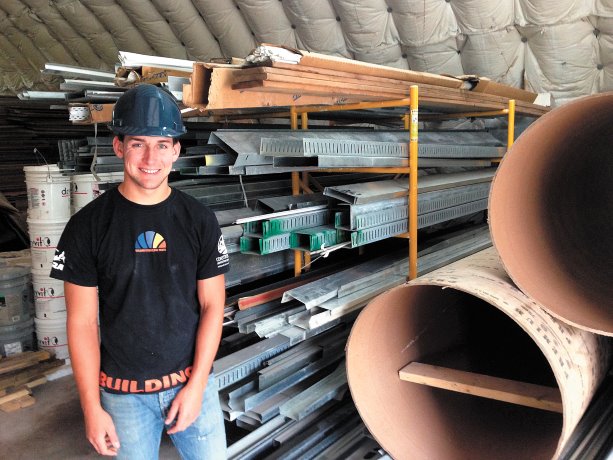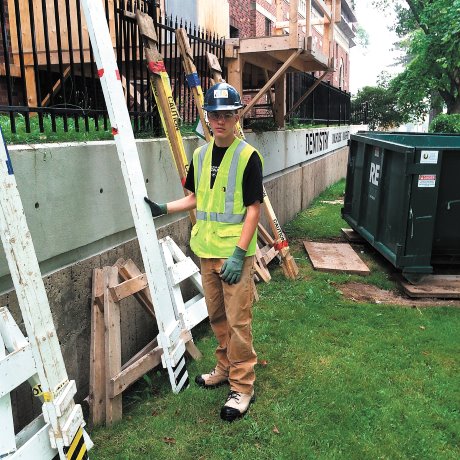The construction industry is going back to school. At this year’s Canadian Apprenticeship Forum conference in Vancouver, speakers from Alberta and Nova Scotia shared a variety of methods to reach teens in high school and expose them to a career in the trades.
"Our industry has moved forward, but unfortunately opinions of it have not," said Matt Trodden, educational initiatives co-ordinator at Merit Contractors Association (Alberta).
"The trades shouldn’t be thought of as a place for bad students. We are trying to change that concept one teacher at time."
The association has partnered with willing school districts to develop a series of programs to give kids trades experience and educate the community about what that career path has to offer.
Kainai High School on the Blood Tribe – Kainai First Nation in southern Alberta recently had 10 students graduate from a unique program where three tiny homes were built.
Students had to submit resumes and references to get accepted. The program was overseen by the school’s shop teacher who showed students how to build three 400-square-foot tiny homes from start to finish.
The class, called Career Pathways to Construction, was funded by the Merit Contractors Association, and designed by Kainai High School and the Kainai Board of Education in partnership with Chinook Career Transitions of southern Alberta.
"These students skipped spring break, worked long days and came to school early to learn and build. They should be proud of what they’ve accomplished and I think all of them have a bright future in construction because of their dedication and work ethic," said Malcolm Kirkland, Merit president, in a release.
In total, Merit is spending $1.2 million during the 2015-16 school year to fund initiatives in schools throughout Alberta to introduce kids to trades.
Line Porfon, vice-president of government relations at Merit, explained one of the keys to success for the school projects is finding supporters at all levels.
"Finding your champions was huge," she said.
This helped getting the right message out to parents and connected the skilled trades to a wider curriculum.
Porfon advised other provinces that the first step involves a lot of meetings and a lot of paperwork. Merit started by meeting with all kinds of people all over Alberta building a network of contacts.
Then it began to find partners, created Memorandums of Understanding and tried to maintain a consistent approach with its messaging.
Now that the programs are wrapping up, Porfon said Merit is hoping to create a forum with the data to allow the various champions at all levels of the initiatives to share their experiences and best practices.
Groups in Nova Scotia are also trying their hand at bringing trades to schools.
The Construction Association of Nova Scotia (CANS) has partnered with the NS Department of Education, the NS Apprenticeship Agency, Nova Scotia Community College (NSCC), local school boards and industry employers to create a program designed to provide Grade 10 and 11 students with the opportunity to safely explore careers in the construction industry.
Originally piloted in Halifax in 2008, the program has since expanded to include all eight Nova Scotia regional school boards and has provided over 500 students province- wide the opportunity to explore careers in construction.
Students are offered CANS industry orientation and safety training at NSCC campuses and five to seven weeks of paid employment as a registered construction trades pre-apprentice. Successful completion of the program can result in up to three co-op credits, banked apprenticeship hours and eligibility for one of three CANS Building Futures for Youth/NSCC scholarships.
Host employers gain a summer employee who is prepared to work in the construction workplace, the opportunity to identify potential future employees and exposure to schools, establishing relationships with students, teachers and community-based learning.
Alain Lefebvre, spokesperson for CANS, explained that the program isn’t without its challenges. It can be difficult for some companies to take on an inexperienced paid employee for the summer.
However, Lefebvre explained it is important for the experience to be real and for students to be paid and treated like any other employee.
It can also be difficult to find employment for students in smaller communities and construction schedules and poor weather can also impact summer placements.
"Two years ago we had a brutal winter, it delayed the entire construction season for us. That found us scrounging to find placement opportunities," Lefebvre said.
He added the program is now looking for more resources and commitment from partners to expand. They are looking to double the roughly 75 to 100 students that take part annually.

1/2
Sydney Academy student Alex Fraser is seen here working for ROCLAN Construction in Sydney, N.S. At this year’s Canadian Apprenticeship Forum conference in Vancouver, speakers from Alberta and Nova Scotia shared a variety of methods to reach teens in high schools.
Photo: The Building Futures for Youth program
2/2
Seen here is C.P. Allen High School student Tyler Ashcroft working for Bird Construction in Halifax.
Photo: The Building Futures for Youth program"










Recent Comments
comments for this post are closed